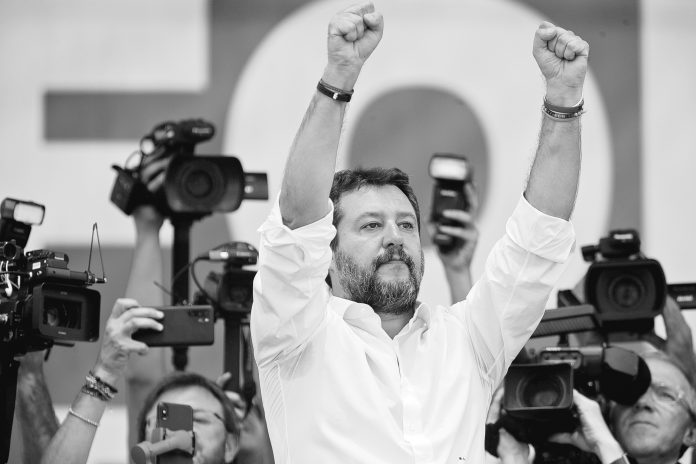
Down but not out, Matteo Salvini pledged Sunday to tens of thousands of die-hard backers of his populist League that he will return to power stronger than before, as he seeks to rebound from a grave political miscalculation that pushed his party from government.
“I’d rather concede seven ministry posts to traitors now that we will win back with interest and transparency in a few months,” Salvini told an annual pilgrimage of cheering, banner-waving League voters to a foothill Lombard town with long historical associations to nationalist movements.
This year’s gathering took on additional significance as Salvini whips up his base in opposition to the new 5-Star-Democratic Party government that took office this month after his failed move to force new elections landed the League as the head of Italy’s opposition and deprived him of his bully pulpit as the hard-line anti-migrant interior minister.
“I expect (Salvini) will continue to be an effective force because the issues he gained credibility for — migration, taxes and security — remain salient,” said Roberto D’Alimonte, a political science professor at Rome’s LUISS University. “And if the (new) government does not address these issues, Salvini’s strength will remain pretty much the same.”
The League remains the most popular party in Italy, and the League voters attending the Pontida pilgrimage made clear they were behind their “captain.”
Many in the crowd placed the blame for Salvini’s fate on the grassroots 5-Star Movement for quickly realigning itself from its League coalition to form a new government with the one-time enemy, the center-left Democratic Party. They branded Premier Giuseppe Conte, head of both governments, a traitor.
Luca Carminati, a laborer from nearby Bergamo, said he switched from voting for the center-right to the League five years ago. He said he has seen his boss struggling to keep a small business afloat in the face of high taxation and bureaucracy.
“I like Salvini because he is the only one that fights the idea of a European Union, which I do not support, because I believe the European bureaucrats do not do Italy any good,” Carminati said. Salvini “is trying to give value to the Italian people again.”
During his speech Salvini muted his often-fiery tones, urging supporters to be patient and polite in their political discourse. This came after a League lawmaker from Veneto drew fire for insulting Italy’s president a day earlier. Still, speakers who took the stage before Salvini spoke of revolution and resistance, and the rank-and-file verbally attacked Italian leftist journalist Gad Lerner, who was flanked by police bodyguards. Lerner has often clashed with Salvini.
Salvini also hit a euro-skeptic note as he warned Italy’s European allies in shaky French, German and English that “the Italian people are no one’s servant.”
Speaking to his base, Salvini said he would make a long-sought flat-tax of 15% a priority if he lands back in government and that in the meantime he would take the fight against migration to the level of local and regional governments, where the League has long prospered. He railed against Islam, burqas and pressed for more regional autonomy from Rome.
D’Alimonte noted a subtle and recent shift in Salvini when he acknowledged that the new government is formally legitimate under the parliamentary system. D’Alimonte said the position indicated “he wants to play by the rules,” though it remains to be seen if that sticks.
Salvini needs to demonstrate even more profound change if he wants to return to power, said analyst Stefano Folli of La Repubblica. His political stumble has challenged his image as “a winner,” and his association with extreme-right parties in France and Germany has flagged him a threat to Europe.
“Salvini is an extreme-right danger that Europe cannot accept. If he maintains that position, he finishes his story,” Folli said. “If he can change — which requires a deep cultural shift and a complicated political journey — and becomes an element of the conservative right in the European dynamic, he could return to government.”q
















